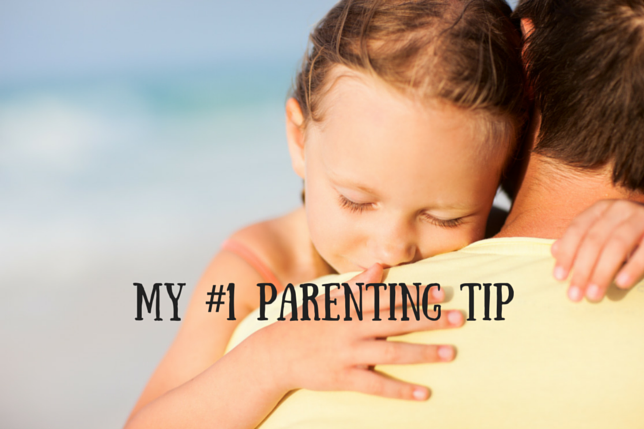When my oldest child was about three years old, I received a valuable parenting tip from a pastor friend. I immediately started applying it to my own parenting, and over the years it has served my husband and I well in raising our four children. I call it my number one Parenting Rule of Thumb. It’s this: Empathize with feelings, while still holding the line.

Empathize with feelings, while still holding the line.
Draw lines, set boundaries, have clear limits for your children. But don’t let your parenting become all about the limits. Make sure you empathize with feelings as well. Connect with your child. Understand your teen, don’t just correct her. You can validate your child’s feelings AND still be firm at the same time.
In real life, it might look like this: You’re at the grocery store with your four-year-old son. He sees his favorite sugary treat and starts begging you to buy it for him. You tell him no. He starts whining and crying and making a scene.
You remember the #1 Rule of Thumb: Empathize with feelings, while still holding the line.
You say, “It’s hard, isn’t it, when you can’t get what you want. You seem sad and upset. It’s okay to be sad and upset. No, sweetie, we’re still not going to buy that.”
What you don’t want to do is empathize with the feelings and give in: “It’s hard, isn’t it, when you can’t get what you want. You seem so upset. Okay, fine, we’ll buy you your cookies. Do you feel better now?”
You also don’t want to hold the line without any empathy: “Stop crying. This is ridiculous. You’re making such a big deal out of this. There’s a lot of good food we’re buying. I am NOT buying that junk for you!”
Empathizing with feelings while still holding the line might mean telling your 9-year-old daughter, “Yes, I know you don’t want to do your book report. I can tell you’re feeling angry that I won’t let you go next door and play with your friend. But sometimes we all have to do things we don’t want to do, even when it’s hard.”
It might mean saying to your 13-year-old son, “Wow, that’s about as angry as I’ve ever heard you. I can tell you’re really mad and you think your teacher was very unfair. But it’s still not okay to use that kind of language. Without swearing, tell me what happened.”
Why is this so important? What’s so great about empathizing with feelings while still holding the line?
This helps our children build emotional intelligence. It helps them identify their feelings and label them. They increase their self-awareness. This is a necessary first step toward being able to empathize with the feelings of others.
And when we empathize with our child’s emotions while still enforcing appropriate limits, we teach him self-control. In their helpful book, “The Power of Validation,” authors Karyn D. Hall and Melissa H. Cook say:
Validating feelings without accepting inappropriate action teaches the child not to allow her feelings to control her and not to act impulsively. To teach a child that she is allowed to be angry is extremely healthy, but to teach her not to respond inappropriately in anger is even better.
As a parent, we don’t like it when our kids feel “negative” feelings. It’s hard to see our children feeling sad, angry, frustrated, discouraged, hurt or ashamed. It can push our buttons, make us reactive. When we don’t empathize, unfortunately we can train our children to disown or deny their negative feelings. We can make it more difficult for them to learn to cope with hard feelings.
But if we remember to “connect, don’t just correct” — if we empathize — if we let them know their reaction is understandable, given the situation — then we train our children to feel their feelings, to understand them, and to not be controlled by them. We train them to become emotionally intelligent.
Question: What do you think? Have you noticed the importance of empathy in parenting? You can leave a comment by clicking here.

Please note: I reserve the right to delete comments that are offensive or off-topic.